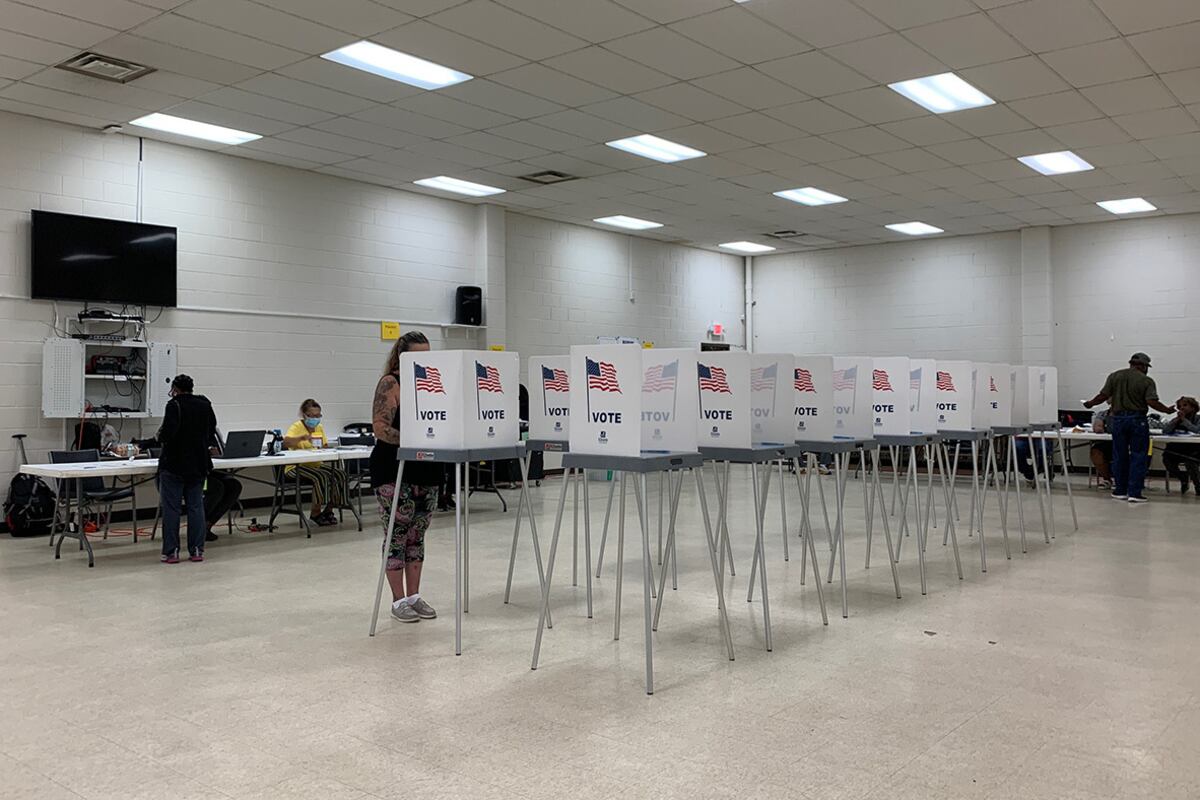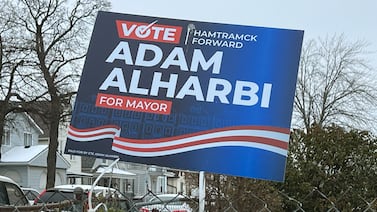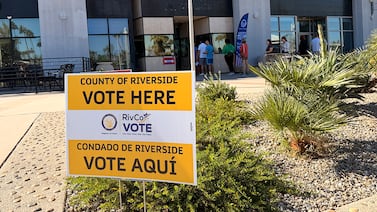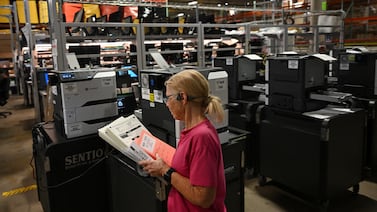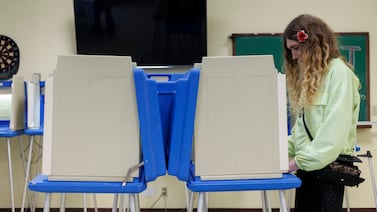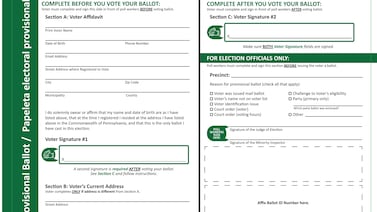Votebeat is a nonprofit news organization reporting on voting access and election administration across the U.S. Sign up for our free newsletters here.
Come Saturday, some Michigan voters will make history as the first residents to take part in a new option for early voting.
While Election Day for several local races around the state is Nov. 7, some cities and townships are choosing to offer early in-person access to the polls in advance of the state’s full adoption of the option next year.
At least 38 communities are providing early voting in the wake of last November’s passage of Proposal 2, the state constitutional amendment that expanded voting rights and overhauled ballot access in Michigan. Beginning next year, those provisions will require a minimum of nine days, and up to 29 days, for voters to cast ballots early in-person.
The trial run in a lower-profile election will also give clerks a chance to see how early voting goes before the high-turnout presidential election next year, generally considered a risky time to make major changes in election administration.
The way early voting works will vary from place to place, depending on clerks’ plans to keep the costs affordable while trying to accommodate their voters.
Oakland County Clerk Lisa Brown is heading the most extensive partnership for this election, a coordinated plan to handle early voting for 26 cities and townships from Oct. 28 to Nov. 5.
For the county-led plan, Brown has set up 12 regional voting sites and one centralized site in Waterford. The regional sites are not permanent voting precincts, but they group together existing precincts for the purpose of early voting.
“So if a community is contracting with us,” Brown said, “voters from those communities will have two different locations that they could vote early at.”
Brown’s staff will provide voting equipment and a ballot-on-demand system, which prints a ballot tailored to the specific voter. Election workers at these sites will use laptops called electronic pollbooks to check voters in and ensure that they haven’t already voted by mail or at another polling site. Voters will cast their ballot by feeding it through tabulators at the sites, a change from Michigan’s previous form of in-person absentee voting, when an early ballot was sealed in an envelope and given to election officials for later counting.
“[Early Voting] is a lot for our local clerks. Some of them don’t have a building where they can do early voting,” said Brown. “They’ve all been very appreciative to us for offering this.”
Brown says Oakland’s early participation in early voting will help her to shore up plans even more for next year.
“Running some of our sites this November will give us an opportunity to see where we can make some tweaks to make it even better for [next] November,” Brown said.
Preparations by Brown’s staff, including elections director Joe Rozell, included checking that new e-pollbooks from the state contain the correct data for the registered voters assigned to each of the sites and ordering up a ballot-on-demand system.
Over the summer, Brown and her staff scouted for early voting locations by visiting several government buildings like the West Bloomfield library and recreation center. Most of the sites being used for the inaugural early voting are buildings such as public auditoriums, libraries, and spaces adjacent to clerks’ offices — rather than the schools and churches often used on Election Day.
Brown was not able to provide the costs this week.
A county-led plan like Oakland’s is just one model Michigan clerks may use to conduct early voting. They can also create their own plan for setting up and staffing early voting in their municipality, or can conduct early voting with one or more neighboring communities in the same county under a municipal agreement in which they share staff, voting equipment, and other resources
The state is offering clerks a share of a $30 million fund to buy equipment, hire staff, and to purchase other necessities to provide early voting. Clerks had until Sept. 8 to put in an application for grants to help fund their early voting operations.
“The $30 million is for all forms of early voting – local jurisdictions doing it on their own, local jurisdictions combining together, and counties partnering with their local jurisdictions,” said Cheri Hardmon, a spokeswoman for the Michigan Secretary of State’s Office. “We have made it clear, repeatedly to clerks, that more of their costs will be covered if they partner together. Those who decide to do early voting on their own will not receive as much money as those who partner. But everyone will receive at least funds to cover their tabulator costs.”
Some municipalities go it alone
One place that’s piloting early voting on its own this November is the Upper Peninsula city of Marquette. For Clerk Kyle Whitney, the four days of early voting will offer valuable experience for him, his staff, and the community’s 14,500 voters.
Residents will vote on local races involving the Marquette city commissioners and members of the Marquette Board of Light and Power.
Whitney said he jumped at the chance to hold early voting, and Marquette’s local poll workers also are hoping to get the chance to work the polls Nov. 2-5 for early voters so that they can practice.
“I wanted to get hands-on experience,” said Whitney.
Whitney puts the cost at $3,000, an amount he was able to keep down by holding early voting for seven precincts at the city library. Whitney says he will have more than 30 election workers rotating in short shifts.
In Wayne County, Westland is the only city offering early voting for this election. City clerk Richard LeBlanc’s office is setting up for three days of early voting in Westland City Hall’s ballroom. He estimates it will cost the city $18,000, mostly because of higher labor costs for the 33 election workers who will work the polling site for the city’s 66,500 registered voters.
LeBlanc, who is running unopposed in this election, is hoping the early voting will be a hit. Although he did not personally vote for Proposal 2 in 2022, he says he wants to see voters get the voting opportunity that is constitutionally afforded them.
“My plan as clerk is to hopefully allow voters a seamless voting experience,” said LeBlanc.
Grand Blanc Township city clerk David Robertson and his deputy clerk, Lynn Henry, are preparing for their pilot for nine days of early voting. Grand Blanc Township voters, numbering 33,000, will head to the township’s early voting site, the auditorium of the township hall, to cast in-person ballots for school and police millages.
“We are entering new territory,” said Robertson. “We are doing [early voting] on our own.”
Neither Robertson or Henry had figures on how much the November election will cost Grand Blanc but said they will offer early voting because it’s the law and they want to be among the first group of local election clerks to try it out.
“To be able to pilot this is a big deal,” said Henry. “It gives us a chance to be better prepared for next year.
Neither Robertson or Henry are anticipating any difficulties.
“We are prepared to do what the law requires of us,” said Robertson. “We’re going to administer this election exactly as the law is written and the people of the state of Michigan intended it to be done. We are up to the task and we’re excited about it.”
Crafting plans for early voting in 2024
While most of the more than 1,500 clerks will not be offering early voting next month, there are still preparations under way for 2024. The next opportunity for early voting will be in the presidential primaries on Feb. 27, then again for the August statewide primary and November general election.
For the past 10 months, clerks have been meeting with others in nearby townships and cities to lay out their plans for early voting.
Ann Arbor Clerk Jackie Beaudry, also the newly elected president of the Michigan Association of Municipal Clerks, said clerks are ready to put the new law into effect.
Ann Arbor doesn’t have an election scheduled for November, but Beaudry says efforts continue to educate residents and University of Michigan students about early voter registration and early voting to avoid a crush of students’ same-day registration that stretched into the early morning hours last November.
Beaudry also had to fill out a grant application to get $245,000 for her city’s early voting plans for 2024.
“We’re asking for new equipment, ballot-on-demand devices, additional tabulators, additional ADA machines,” said Beaudry. “It’s like we’re adding all new precincts.”
Beaudry said the city has 53 precincts, three satellite locations for voter registration, and six early vote centers, three of which will be campus-operated for voter registration.
While there’s no election to prepare for in the next couple of months, that is not stopping Beaudry from getting down to business in preparation for Michigan’s presidential primary. Beaudry says she is looking to order new voting equipment such as tabulators, ballot-on-demand printers, and ADA-assisted terminals.
Elsewhere in Washtenaw County, Chief Deputy Clerk Edward Golembiewski is preparing to oversee a county-led plan for early voting next year for 200,000 of the county’s 320,000 registered voters.
Twenty-three of Washtenaw’s municipalities will have the county conduct its early voting in February. Golembiewski has submitted a funding request to the state to take care of expenses, including money to pay poll workers, order new tabulators, and get ballot-on-demand technology.
Golembiewski says voters have been asking about early in-person voting for a while.
“It’s historic. Voters are going to be offered so many more options and expanded access than they’ve had in the past and early voting is one of those,” said Golembiewski. “I think many voters are going to take the opportunity to sign up for it.”
Golembiewski says he’s “proud and pleased” to be entering into agreements with many municipalities to offer early voting while saving taxpayers money and offering his local communities a way to conduct voting in a coordinated manner.
In south Michigan’s Hillsdale County, which soundly rejected Proposal 2, Deputy Clerk Abe Dane is putting the final touches on a county-led plan for early voting in next year’s elections. Dane said all but one of the 26 precincts in his jurisdiction is interested in having the county take care of the early voting plans. Somerset Township was the lone holdout.
Dane said there are a lot of costs associated with labor and mailings informing voters where early voting is taking place. He added that the equipment costs for tabulators, an electronic pollbook, and ballot-on-demand printer is an “upfront cost’' that won’t be financially burdensome in the long run.
Dane said he is aiming to keep the costs to provide early voting for the precincts well below $1,000 per precinct.
“It’s about saving money,” said Dane. “It’s really expensive, especially starting out.”
Oralandar Brand-Williams is a senior reporter for Votebeat in partnership with Bridge Michigan. Contact Oralandar at obrand-williams@votebeat.org.

